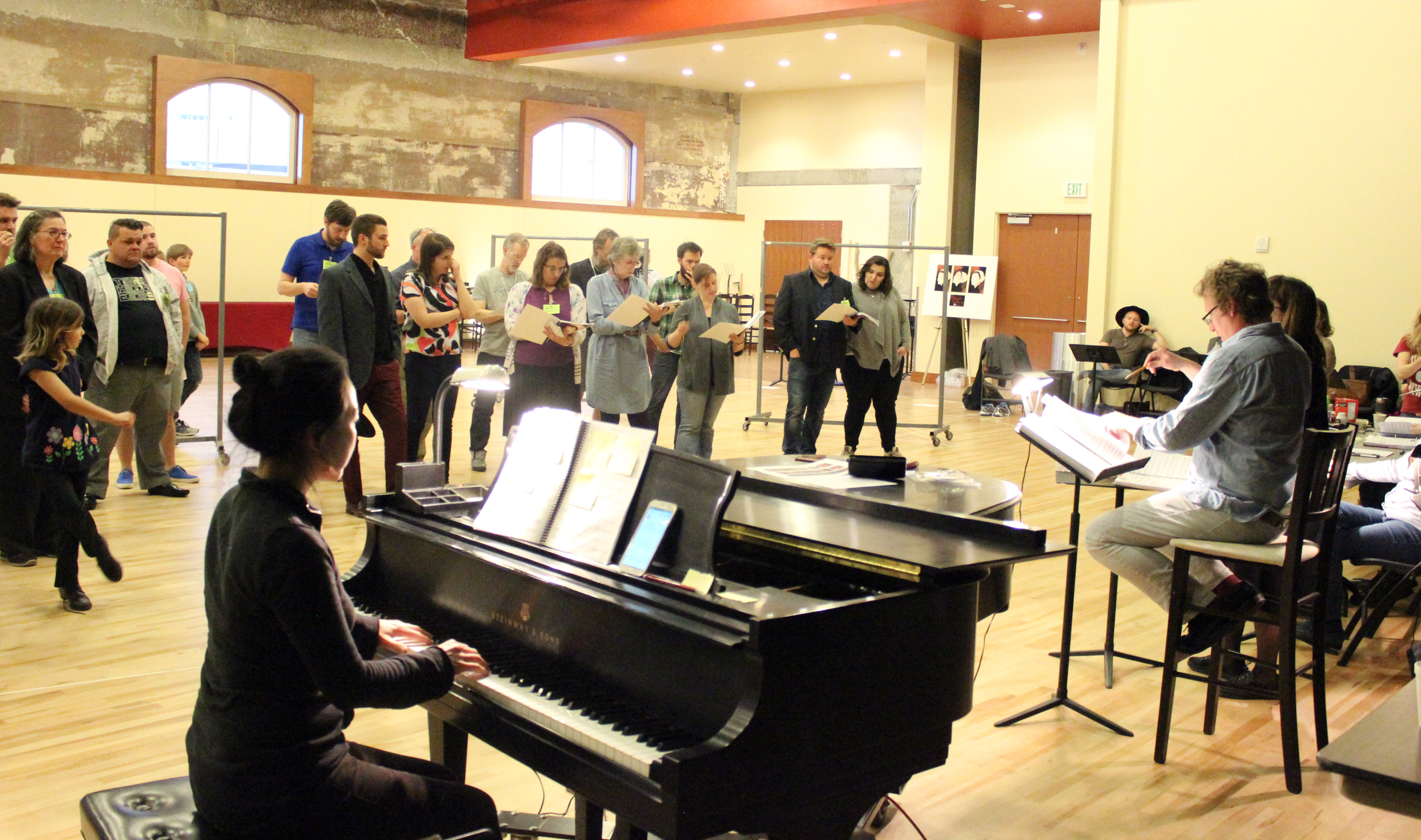
A small army of seamstresses works at sewing machines inside a warehouse in north Denver, creating costumes for Opera Colorado’s latest production.
But there's nothing grandiose being created. The fabric is unusually drab for the opera stage. The team is crafting outfits for the premiere of “The Scarlet Letter” -- the classic novel and high-school English class staple about American Puritanism.
“Pretty much everything is black or gray,” says Ann Piano, Opera Colorado’s costume director. “Puritan. A little bit of brown.”
It’s just a few days before the first dress rehearsal and the opera company’s chorus members -- who play the townsfolk -- still need their costumes.
“We will be here from the morning until the wee hours every day sewing,” Piano says. “We like to say the speeding train is coming, so sew faster.”
Everything -- from the costumes to the rehearsals -- needs to be fine-tuned by Saturday. That’s when Opera Colorado unveils “The Scarlet Letter.”
During a recent rehearsal, the cast sings about morality in the opening scene. It introduces their colonial society and sets the tone for the story:
One law for the sea we crossed.
One law for the forest dark.
One law for the savage heart.
One law for the babe in arms.
‘We Need To See Figures Like That’
Nathaniel Hawthorne wrote “The Scarlet Letter” in 1850. In it, the character of Hester Prynne wears a red letter 'A' on her clothing after being convicted of adultery and giving birth to a child while her husband is away. Her Puritan neighbors in 17th-century Boston scorn her and make her an outcast.
Composer Lori Laitman, who wrote the opera version of “The Scarlet Letter” nearly 10 years ago, says it almost cried out for the opera treatment.
“First of all you’ve got … this beautiful young woman who bears a child out of wedlock in Puritan society. I mean, already that’s pretty amazing and operatic,” Laitman says.
Laitman, who lives in Potomac, Md., says she read the novel in high school but found it much more powerful as an adult.
“It was so ahead of its time in showing how a woman could be mistreated by a community, and how they can recover,” she says.
David Mason, the Colorado poet who wrote the words for the opera, calls Hester one of the great feminist characters in all of literature -- full of dignity and courage. He says the story feels perfectly relevant today, even though it depicts an era hundreds of years old.
“We are still in a time when we need to see figures like that,” Mason says. “And we need to understand what it is that confronts them and oppresses them in our culture. We’re not as far removed from Puritanism as we might want to be.”
The characters in “The Scarlet Letter” endure a lot of misery. But the opera also finds space for a tender aria amid all the drama, when Hester comforts her infant daughter Pearl and croons.
Nothing will come to harm you, Pearl,
as long as I’m alive.
This lullaby I sing to you.
May you live long and thrive.
A Long Birthing Process
Opera Colorado’s creative team decided in 2010 they wanted to put the Scarlet Letter onstage in Denver.
Greg Carpenter, Opera Colorado’s general director, says they’d been looking for a work to premiere. “The Scarlet Letter,” he says, had the right elements: a subject that would resonate with the audience and accessible music.
Three years later Opera Colorado was set to bring “The Scarlet Letter” to the stage in spring 2013.
But a few months before opening night the company revealed it had a budget shortfall of about $700,000. Opera Colorado was struggling. (That’s not unusual in the opera world where fundraising generally pays for more than half the cost of a production.)
Carpenter says the math was simple. Most classic operas cost about $750,000 for four shows. The Scarlet Letter would cost about $1 million. That price tag includes new costumes, the new set and the composer’s fee.
So Carpenter said the company decided to postpone it and raise money to stabilize the company’s finances.
Opera Colorado retooled its budget and set 2016 as the year to debut “The Scarlet Letter.” Even during the delay, some big supporters remained enthusiastic about the opera.
Carpenter says there are donors who like funding a classic opera like “The Magic Flute” or “The Barber of Seville.”
“But if you give them an exciting project to buy into, like ‘The Scarlet Letter,’” he says, “suddenly they take a sense of ownership and pride in it. And that inspires them to a new level of generosity.”
That generosity doesn’t surprise Marc Scorca. He runs Opera America, a nonprofit that supports opera companies and fosters new productions.
Scorca says there’s real interest among donors to help premiere new works that speak to contemporary audiences.
There’s the new opera "JFK," which just premiered in Fort Worth. And this weekend, Stephen King’s “The Shining” debuts at Minnesota Opera.
Scorca says this growth comes in part because many modern composers want to work in opera.
"And some people do use the word ‘renaissance,’ but renaissance implies a rebirth," he says, "whereas this is in fact a bona fide birth. “
Opera America maintains a list of North American opera premieres since the 19th century. It says 11 American operas debuted in 1995. That number was 29 a decade later, and it jumped to 44 in 2015.
Scorca says it’s also because opera audiences can be pretty adventurous. Many opera fans crave new experiences -- like "The Scarlet Letter."
‘So Confident’
Stagehands raise one of the walls for the set of The Scarlet Letter. It’s a stark gray backdrop. Carpenter says it pulls the audience into the characters’ harsh world.
“Every aspect of it, including the simplicity of their homes, their clothing, things like that,” he says. “The set really reflects that austerity.”
Laitman, the composer, says she and the Opera Colorado team pored over every detail, down to Hester’s vivid red ‘A’ and Pearl’s floral dress.
She says The Scarlet Letter is a richer opera now than it would have been in 2013.
“Even with all of the disappointment of the delay and everything -- I think everything worked to make it the strongest piece it could be,” she says. “And I feel so confident and so grateful.”
Opera Colorado also has newfound confidence. Carpenter says they're already looking at more new works -- including a production next year that explores transgender issues.
“I think that’s where we’ve sort of, you know, taken a whole new view of who we want to be and are not afraid to just stand out there and talk about it,” he says.
And for Opera Colorado, that new era begins when “The Scarlet Letter” hits the stage Saturday night in downtown Denver.
View the program for Opera Colorado’s production of “The Scarlet Letter:”









